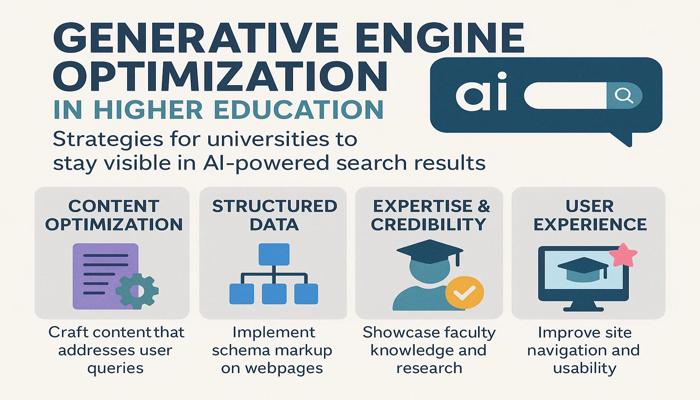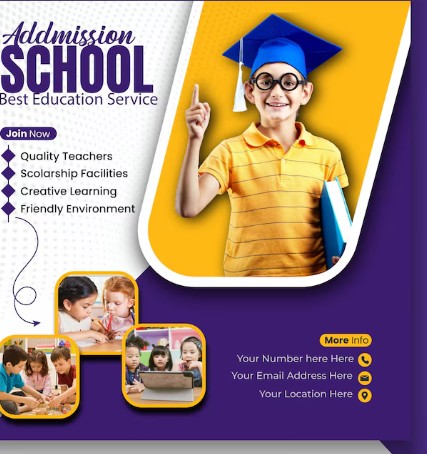How Generative Engine Optimization Is Reshaping Higher Education SEO

Strong 8k brings an ultra-HD IPTV experience to your living room and your pocket.
Search is changing fast. AI-powered platforms like Google’s Search Generative Experience (SGE) are shifting how students and parents discover information online. In this new world, universities must rethink how they approach SEO. Traditional methods are no longer enough. Generative Engine Optimization, or GEO, is now becoming essential for staying visible.
What Is Generative Engine Optimization?
Generative Engine Optimization focuses on improving how content is picked up and presented in AI-generated answers. These are the quick, paragraph-style responses shown at the top of many search pages.
Instead of just ranking for keywords, GEO helps content appear in these AI summaries. That means the content needs to sound helpful, be well-structured, and match the intent of the question.
AI tools look for more than just keyword matching. They want clear, complete, and human-like content that answers specific user queries.
Why Traditional SEO Is No Longer Enough
SEO has always focused on keywords, backlinks, and technical performance. These factors still matter. But AI-powered engines like SGE are changing the rules.
Here’s why:
AI does not just show links. It creates summaries based on what it finds.
It picks content that feels helpful and well-explained.
It favours trustworthy sources and topic authority.
It pulls from structured data, FAQs, and semantically rich pages.
If your university content is not written to support AI models, it may get missed—even if your site ranks well. That’s where higher education SEO services come into play. They help institutions stay ahead by adapting to the changing nature of search.
How Generative Engine Optimization Impacts Higher Education
Universities serve a diverse audience. Students, parents, working professionals, and international applicants all have different needs. GEO helps ensure your content reaches them during their search journey.
Here are some key shifts in higher education SEO:
1. Focus on Natural Language Queries
People are searching in full sentences and questions. They ask things like:
"Which is the best university in India for law?"
"Does XYZ University offer scholarships for MBA?"
"What are the hostel fees at ABC University?"
Your content must match this tone. Use headings and paragraphs that clearly answer these types of questions.
2. Structure Content for AI Readability
AI prefers content that follows a clear format. Use:
Bullet points
Short paragraphs
Clear headings (H1, H2, H3)
FAQs with natural questions
Well-structured content improves the chance of being quoted in AI-generated snippets.
3. Optimize for Entity SEO
AI tools focus on known entities. This means your university’s name, courses, departments, locations, and accreditations should be consistent across the web.
Use schema markup. Update Google Business profiles. Build citations in reputable directories. This helps AI engines link your name to the right context.
4. Update Content Regularly
AI rewards fresh content. Update your course pages, admission info, event calendars, and student blogs. This keeps your website relevant.
Even small edits like date changes or FAQ updates signal freshness to search engines.
5. Publish Expert-Led Content
AI prefers content with strong sources. Encourage faculty, deans, or alumni to share advice and stories. Expert content builds trust and gives your website a voice.
Blogs, videos, webinars, and articles with real names and credentials perform better in AI-powered search.
6. Answer Real Student Questions
Use insights from your admissions team, chatbot logs, or Google Search Console. Identify top questions students ask. Then create content that answers them clearly.
A few examples include:
“What is the average placement salary after BTech?”
“Is an MBA from XYZ University accepted abroad?”
“Can I get a scholarship if I have a 75% score?”
These are the types of questions AI engines like to pull answers from.
Generative Engine Optimization Strategies for Universities
Here’s a quick list of actions your university can take today:
Review and rewrite key content in a question-answer format
Add FAQs on every course page
Use schema markup for courses, events, reviews, and locations
Create content that aligns with People Also Ask queries
Write blog posts based on real-life student concerns
Avoid jargon and long sentences
Include internal links and citations from credible sources
Track impressions and clicks from new search features in Google Search Console
These actions are often supported by expert higher education SEO services that understand the latest trends in AI search behavior.
How Higher Education Content Marketing Supports GEO
Your content marketing plan should now serve both humans and machines. This means writing blog posts, guides, and landing pages that offer value but also fit into how AI selects content.
Here’s how higher education content marketing helps:
Tells your story in a clear and engaging way
Builds authority around your academic strengths
Helps your university appear in AI-driven search summaries
Improves trust through transparency and consistency
Every blog, testimonial, or program guide you publish is now part of your SEO strategy.
Final Thoughts
Generative Engine Optimization is not a passing trend. It is a shift in how people find and trust information. For universities, this is a chance to adapt and lead.
By writing clear content, answering real questions, and building structured pages, you help AI engines understand and promote your message. This makes your institution more visible, more trusted, and more aligned with how students search today.
Universities that invest in smart higher education SEO services and consistent higher education content marketing will stay ahead in this new search environment.
Note: IndiBlogHub features both user-submitted and editorial content. We do not verify third-party contributions. Read our Disclaimer and Privacy Policyfor details.




